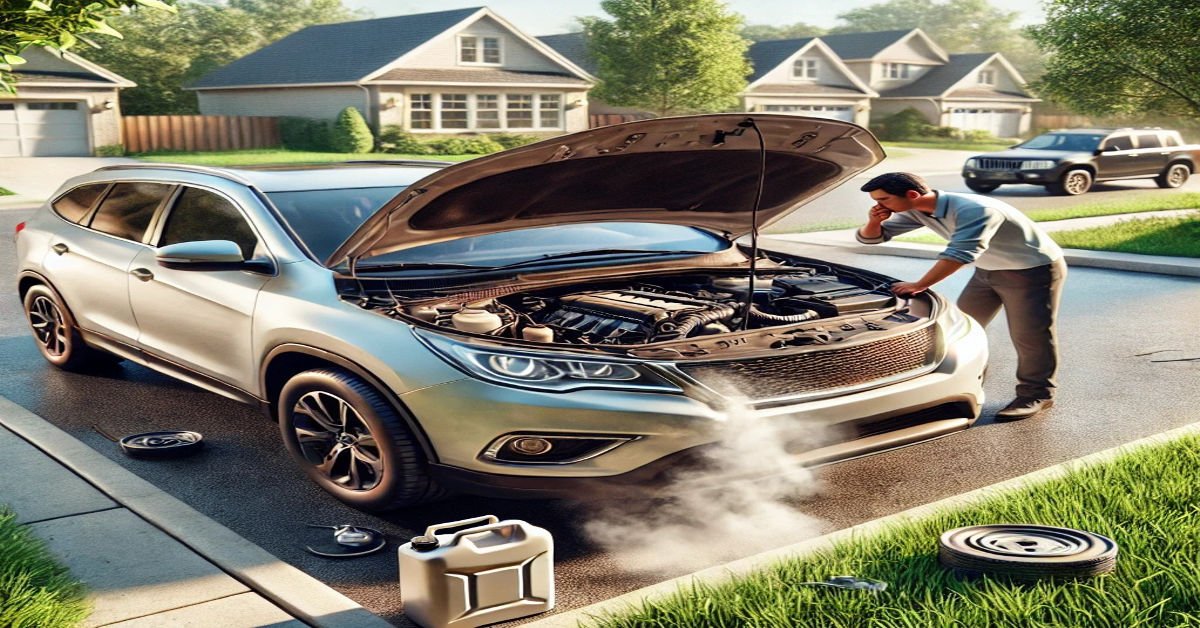The unmistakable odor of gasoline inside or around your car is more than just a minor inconvenience—it could be an early warning sign of a serious issue that requires your immediate attention. While a faint gas smell can sometimes be noticed after refueling or in older vehicles a persistent or strong gasoline odor should never be ignored. It’s crucial to understand the causes of this smell and how to address them to ensure your car is safe and running smoothly.
In this article, we’ll explore the common reasons why your car might smell like gas and what steps you should take to resolve the issue. Whether you’re dealing with a simple leak or a more complex problem, we’ll guide you through the potential causes and how to take care of them.
Understanding the Gasoline Smell in Your Car
Before diving into the possible causes of a gasoline odor, it’s important to understand what could be triggering the smell. Gasoline is a volatile substance, and its strong, distinct odor is often noticeable when there’s a problem with your car’s fuel system. There are several components in your vehicle that could be involved in a gasoline smell, including the fuel tank, fuel lines, and the fuel injectors.
A gasoline smell could come from a leak, an issue with the engine, or even a problem with the fuel system’s ventilation. Regardless of the cause, it’s crucial to investigate the issue promptly, as a gas leak in or around your vehicle could be dangerous.
Common Reasons Your Car Smells Like Gas
There are several potential reasons your car might have a gasoline smell. Let’s explore the most common ones:
Fuel Tank Issues
The fuel tank is one of the most common places to start when investigating the source of a gasoline smell. Over time, the fuel tank can develop cracks, especially if the car is old or has been involved in an accident. Even small cracks can lead to gasoline leaks, causing the distinct odor.
If the fuel tank is damaged, gasoline can seep out when the car is running or when it’s parked. This type of issue is serious and can lead to fire hazards, so it’s important to address it immediately.
Leaking Fuel Lines
Another common culprit of a gasoline odor is a leak in one of the fuel lines. Your car’s fuel lines are responsible for transporting fuel from the tank to the engine. Over time, these lines can become worn, corroded, or damaged. A leaking fuel line will allow gasoline to escape, often near the engine, causing a strong smell of gas inside or around the vehicle.
If you suspect that a fuel line is leaking, it’s essential to have it inspected and repaired right away. A leaking fuel line can not only cause unpleasant odors but also be a serious fire risk.
Faulty Fuel Injectors
Fuel injectors play a crucial role in delivering fuel to your car’s engine. If one or more of the injectors are faulty, they can cause fuel to leak or spray improperly. This can lead to gasoline pooling around the engine, causing a noticeable gas smell.
Symptoms of a faulty fuel injector may include poor engine performance, rough idling, or even a decrease in fuel efficiency. If you suspect that the fuel injectors are the problem, it’s best to consult a mechanic to get them repaired or replaced.
Evaporative Emission Control System (EVAP) Issues
The EVAP system is designed to control and prevent the release of harmful fumes from the fuel tank and fuel lines into the atmosphere. If there’s a problem with this system, such as a cracked charcoal canister, faulty valve, or damaged hose, it can cause gasoline vapors to escape, resulting in a noticeable gasoline smell.
If your car has a malfunctioning EVAP system, it can lead to more than just a bad odor. The system is essential for your vehicle’s overall emissions and fuel efficiency. A professional inspection and repair are recommended to address any issues with the EVAP system.
Loose or Damaged Gas Cap
Sometimes, the simplest explanation is the most likely one. If your gas cap isn’t properly secured or if it’s damaged, fuel vapors can escape from the fuel tank. A loose or broken gas cap can cause a gasoline smell, especially after refueling.
It’s important to regularly check the condition of your gas cap to ensure it’s tightly sealed and in good condition. If the gas cap is damaged, replacing it is an easy and inexpensive fix.
Fuel Tank Venting Problems
Your car’s fuel system is designed to vent gas vapors to prevent pressure from building up in the tank. If the venting system becomes blocked or damaged Why Does My Car Smell Like Gas, it can cause pressure to build up, which can force gasoline vapors to escape. This can lead to a gas smell around the vehicle, especially when the car is parked in the sun or during long drives.
Venting problems may be linked to issues with the fuel tank or its associated components, such as hoses or valves. A mechanic can help you identify and fix venting issues to eliminate the smell.
Engine Problems
In some cases, the smell of gasoline may not be caused by a leak in the fuel system but rather by an issue with the engine itself. If your engine is running too rich (meaning it’s burning too much fuel), excess gasoline may escape through the exhaust system, causing a gasoline odor. This can happen if there’s a problem with the air-fuel mixture, the fuel pressure regulator, or the oxygen sensors.
While engine problems are less likely to be the direct cause of a gasoline smell, they can still contribute to the issue. A mechanic can diagnose the cause of the engine issue and ensure it’s properly addressed.
Why You Shouldn’t Ignore a Gasoline Smell in Your Car
A gasoline odor in your car is more than just a nuisance—it’s a potential safety hazard. Gasoline is highly flammable, and even small leaks can lead to dangerous situations. If you notice a strong or persistent gasoline smell, it’s crucial to take the necessary steps to address the issue promptly.
Here are some reasons why you should never ignore a gasoline smell:
- Fire risk: Leaking gasoline can ignite if exposed to heat or a spark, putting your car and yourself in danger.
- Health concerns: Inhaling gasoline fumes can cause headaches, dizziness, nausea, and other health issues.
- Worsening damage: A small issue, if ignored, can become a more significant and expensive problem later on.
Addressing the issue early on will not only keep you safe but also save you money on costly repairs down the road.
Steps to Take If Your Car Smells Like Gas
If you notice a gasoline smell in your car, here’s what you should do:
- Check the gas cap: Ensure that the gas cap is tightly closed and not damaged. If it’s loose or broken, replace it immediately.
- Inspect the fuel system: Look for visible signs of leaks around the fuel tank, fuel lines, and fuel injectors. If you notice any leaks, contact a mechanic for a professional inspection.
- Get the EVAP system checked: If the problem persists, have your vehicle’s EVAP system inspected for damage or malfunction.
- Visit a mechanic: If you can’t identify the cause of the smell or if the smell is particularly strong, it’s best to visit a certified mechanic. They can conduct a thorough inspection and diagnose the issue accurately.
Conclusion
A gasoline smell in your car is not something to take lightly. While it can be caused by minor issues like a loose gas cap, it could also be a sign of more significant problems with your vehicle’s fuel system. Whether it’s a leaking fuel line, a faulty fuel injector, or a malfunctioning EVAP system, addressing the issue promptly is essential for your safety and the health of your vehicle.
If you notice a persistent gas odor in or around your car, don’t hesitate to take action. Regular maintenance, timely repairs, and paying attention to warning signs can help you keep your car running smoothly and prevent more serious problems down the road.
FAQs
Why does my car smell like gas after I fill it up?
A faint gas smell after refueling can be normal, but if it persists, it could indicate a problem with the gas cap, fuel lines, or EVAP system.
Is a gasoline smell in my car dangerous?
Yes, gasoline fumes are flammable and can pose a fire risk, making it crucial to address the issue immediately.
What should I do if my car smells like gas but the gas cap is fine?
Check for leaks in the fuel system, including the fuel lines and injectors, and get your EVAP system inspected.
Can a leaking fuel injector cause a gas smell?
Yes, a leaking fuel injector can cause gasoline to pool around the engine, resulting in a strong gas odor.
How can I tell if my car has a venting problem?
If the gas smell intensifies after long drives or when the car is parked in the sun, a venting problem may be the cause.
How do I prevent gasoline smells in my car?
Regularly inspect your vehicle’s fuel system, replace damaged components, and address issues like leaks or a faulty gas cap promptly.







